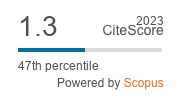Alternative Fuels as a Sustainable Innovation in Vehicle Fleet Across the EU–27: Diagnosis and Prospects for Development
DOI:
https://doi.org/10.18778/1508-2008.27.36Keywords:
alternative fuels, sustainable innovation, sustainable development, passenger car fleet, EU–27, environmentAbstract
The deployment of alternatively fueled (AF) vehicles constitutes an important measure in meeting the European Union’s (EU’s) climate goals. The study aims to characterize and evaluate, in a comparative manner, the current stage of the adoption of AF passenger cars into the general (M1) passenger car fleet in the EU member states. The focal point of the study is the exploration of similarities and differences observed between the EU countries regarding the current structure of AF passenger car fleets, as well as development trends in this area. In this context, a clear scheme of “two speeds” emerges – parallel to the rapid diffusion of electric vehicles in the Nordic and Western European countries, the size and structure of the AF M1 vehicle stock remained largely unchanged in the Central‑European countries, with the dominant role of widely established liquified petroleum gas (LPG). The findings highlight the need to diversify the range of alternative fuels, which should be introduced gradually, in line with the classification proposed by the European Parliament and the Council.
Downloads
References
Adomako, S., Nguyen, N.P. (2023), Co‑innovation behavior and sustainable innovation in competitive environments, “Sustainable Development”, 31 (3), pp. 1735–1747, https://doi.org/10.1002/sd.2479
Google Scholar
DOI: https://doi.org/10.1002/sd.2479
Alternative Fuels Data Center (n.d.), Alternative Fuels and Advanced Vehicles, https://afdc.energy.gov/fuels/ (accessed: 16.09.2023).
Google Scholar
Alternative Fuels Data Center (n.d.), Ethanol Fuel Basics, https://afdc.energy.gov/fuels/ethanol_fuel_basics.html (accessed: 16.09.2023).
Google Scholar
Alternative Fuels Data Center (n.d.), Hydrogen, https://afdc.energy.gov/fuels/hydrogen.html (accessed: 16.09.2023).
Google Scholar
Alternative Fuels Data Center (n.d.), Natural Gas, https://afdc.energy.gov/fuels/natural_gas.html (accessed: 16.09.2023).
Google Scholar
Alternative Fuels Data Center (n.d.), Propane Benefits and Considerations, https://afdc.energy.gov/fuels/propane_benefits.html (accessed: 16.09.2023).
Google Scholar
Basiago, A.D. (1995), Methods of defining ‘sustainability’, “Sustainable Development”, 3 (3), pp. 109–119, https://doi.org/10.1002/sd.3460030302
Google Scholar
DOI: https://doi.org/10.1002/sd.3460030302
Breitkreuz, K., Menne, A., Kraft, A. (2014), New process for sustainable fuels and chemicals from bio‑based alcohols and acetone, “Biofuels, Bioproducts and Biorefining”, 8 (4), pp. 504–515, https://doi.org/10.1002/bbb.1484
Google Scholar
DOI: https://doi.org/10.1002/bbb.1484
Cillo, V., Petruzzelli, A.M., Ardito, L., Del Giudice, M. (2019), Understanding sustainable innovation: A systematic literature review, “Corporate Social Responsibility and Environmental Management”, 26 (5), pp. 1012–1025, https://doi.org/10.1002/csr.1783
Google Scholar
DOI: https://doi.org/10.1002/csr.1783
DesJardins, J. (2015), Sustainability, [in:] Wiley Encyclopedia of Management, https://doi.org/10.1002/9781118785317.weom020212
Google Scholar
DOI: https://doi.org/10.1002/9781118785317.weom020212
DHL (n.d.), Alternative fuels: What the future holds?, https://www.dhl.com/global‑en/delivered/sustainability/future‑of‑alternative‑fuels.html (accessed: 15.09.2023).
Google Scholar
European Alternative Fuels Observatory (n.d.), About the European Alternative Fuels Observatory, https://alternative‑fuels‑observatory.ec.europa.eu/general‑information/about‑european‑alternative‑fuels‑observatory (accessed: 20.09.2023).
Google Scholar
European Alternative Fuels Observatory (n.d.), Alternative fuels, https://alternative‑fuels‑observatory.ec.europa.eu/general‑information/alternative‑fuels (accessed: 5.10.2023).
Google Scholar
European Alternative Fuels Observatory (2023), Road, https://alternative‑fuels‑observatory.ec.europa.eu/transport‑mode/road (accessed: 11.09.2023).
Google Scholar
European Commission (2021), Proposal for a Regulation of the European Parliament and of the Council on the deployment of alternative fuels infrastructure, and repealing Directive 2014/94/EU of the European Parliament and of the Council, https://eur‑lex.europa.eu/resource.html?uri=cellar:dbb134db‑e575-11eb‑a1a5-01aa75ed71a1.0001.02/DOC_1&format=PDF (accessed: 18.09.2023).
Google Scholar
European Council for an Energy Efficient Economy (2023), Effort Sharing Regulation, https://www.eceee.org/policy‑areas/product‑policy/effort‑sharing‑regulation/ (accessed: 3.10.2023).
Google Scholar
European Environment Agency (2020), EC, 2020, “2050 long‑term strategy”, https://www.eea.europa.eu/policy‑documents/ec-2020-2050‑long‑term‑strategy (accessed: 20.09.2023).
Google Scholar
Eurostat (2023), Passenger cars, by type of motor energy [ROAD_EQS_CARPDA], https://ec.europa.eu/eurostat/databrowser/view/road_eqs_carpda/default/table?lang=en (accessed: 30.09.2023).
Google Scholar
EVgo (n.d.), Types of Electric Vehicles, https://www.evgo.com/ev‑drivers/types‑of‑evs/ (accessed: 15.09.2023).
Google Scholar
ExxonMobil (n.d.), EMRD renewable diesel process technology, https://www.exxonmobilchemical.com/en/catalysts‑and‑technology‑licensing/emrd?utm_source=google&utm_medium=cpc&utm_campaign=cl_emrd_none&ds_k=renewable+diesel&gclsrc=aw.ds&&ppc_keyword=renewable%20diesel&gclid=EAIaIQobChMIkLuw1ceugQMVfkZBAh13cgScEAAYASAAEgII1_D_BwE (accessed: 16.09.2023).
Google Scholar
Farghali, M., Osman, A.I., Chen, Z., Abdelhaleem, A., Ihara, I., Mohamed, I.M.A., Yap, P.‑S., Rooney, D.W. (2023), Social, environmental, and economic consequences of integrating renewable energies in the electricity sector: a review, “Environmental Chemistry Letters”, 21, pp. 1381–1418, https://doi.org/10.1007/s10311-023-01587-1
Google Scholar
DOI: https://doi.org/10.1007/s10311-023-01587-1
Huang, D., Zhou, H., Lin, L. (2012), Biodiesel: an Alternative to Conventional Fuel, “Energy Procedia”, 16 (C), pp. 1874–1885, https://doi.org/10.1016/j.egypro.2012.01.287
Google Scholar
DOI: https://doi.org/10.1016/j.egypro.2012.01.287
IDTechEx (n.d.), Sustainable Alternative Fuels 2021–2031, https://www.idtechex.com/en/research‑report/sustainable‑alternative‑fuels-2021-2031/799 (accessed: 15.09.2023).
Google Scholar
International Energy Agency (2018), Nordic EV Outlook 2018. Insights from leaders in electric mobility, https://doi.org/10.1787/9789264293229‑en
Google Scholar
Kumar, M. (2020), Social, Economic, and Environmental Impacts of Renewable Energy Resources, [in:] K.E. Okedu, A. Tahour, A.G. Aissaou (eds.), Wind Solar Hybrid Renewable Energy System, IntechOpen, pp. 227–238, https://doi.org/10.5772/intechopen.89494
Google Scholar
DOI: https://doi.org/10.5772/intechopen.89494
Liu, F., Su, C.W., Qin, M., Umar, M. (2023), Is renewable energy a path towards sustainable development?, “Sustainable Development”, 31 (5), pp. 3869–3880, https://doi.org/10.1002/sd.2631
Google Scholar
DOI: https://doi.org/10.1002/sd.2631
Luo, Z., Hu, Y., Xu, H., Gao, D., Li, W. (2020), Cost‑Economic Analysis of Hydrogen for China’s Fuel Cell Transportation Field, “Energies”, 13 (24), 6522, https://doi.org/10.3390/en13246522
Google Scholar
DOI: https://doi.org/10.3390/en13246522
Martin, A.J., Larrazabal, G.O., Perez‑Ramirez, J. (2015), Towards sustainable fuels and chemicals through the electrochemical reduction of CO2: lessons from water electrolysis, “Green Chemistry”, 12, pp. 5114–5130, https://doi.org/10.1039/C5GC01893E
Google Scholar
DOI: https://doi.org/10.1039/C5GC01893E
Nasiri, M., Saunila, M., Rantala, T., Ukko, J. (2022), Sustainable innovation among small businesses: The role of digital orientation, the external environment, and company characteristics, “Sustainable Development”, 30 (4), pp. 703–712, https://doi.org/10.1002/sd.2267
Google Scholar
DOI: https://doi.org/10.1002/sd.2267
No, S.‑Y. (2019), Parffinic Biofuels: HVO, BTL Diesel, and Farnesane, [in:] S.‑Y. No, Application of Liquid Biofuels to Internal Combustion Engines, Springer Nature Singapore Pte Ltd., Singapore, pp. 147–179, https://doi.org/10.1007/978-981-13-6737-3_4
Google Scholar
DOI: https://doi.org/10.1007/978-981-13-6737-3_4
Thomas, G., Parks, G. (2006), Potential Roles of Ammonia in a Hydrogen Economy. A Study of Issues Related to the Use Ammonia for On‑Board Vehicular Hydrogen Storage, U.S. Department of Energy, https://www.energy.gov/eere/fuelcells/articles/potential‑roles‑ammonia‑hydrogen‑economy (accessed: 19.09.2023).
Google Scholar
United Nations Economic Commission for Europe (2023), Consolidated Resolution on the Construction of Vehicles (R.E.3). Revision 7, https://unece.org/sites/default/files/2023-12/ECE_TRANS_WP.29_78_Rev.7e.pdf (accessed: 20.10.2023).
Google Scholar
World LPG Association (WLPG), Liquid Gas Europe (2022), Autogas Incentive Policies, https://www.liquidgaseurope.eu/wp‑content/uploads/2024/05/Autogas_Incentive_Policies_2022.pdf (accessed: 1.06.2024).
Google Scholar
Downloads
Published
How to Cite
Issue
Section
License

This work is licensed under a Creative Commons Attribution-NonCommercial-NoDerivatives 4.0 International License.











